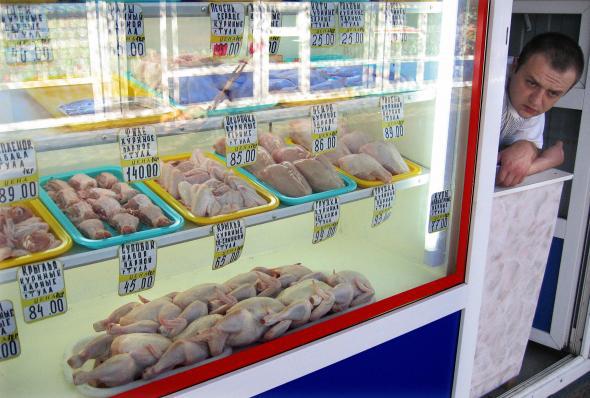The Russian government has responded to Western sanctions over the conflict in Ukraine by banning all food imports from the United States as well as fruits and vegetables from Europe. While the economic impact of this move is going to be less severe than the sanctions against Russia, it will be felt in some sectors. Russia is the largest export market for fruits and vegetables from the EU and the second-largest market for U.S. poultry. American exports have already taken a hit due to tension with Russia, and that’s likely to continue now.
Over the years, the chicken trade has been a reliable barometer of the state of U.S.-Russian relations. In the early 1990s, the U.S. flooded the Russian market with cheap poultry—known locally as “Bush legs”—as a form of food aid. American chicken imports have previously been restricted in 2002, after the U.S. raised steel tariffs; in 2008, during the war with Georgia; and again in 2010, ostensibly because U.S. manufacturers had failed to adhere to food safety regulations. According to an account by journalist Peter Baker, Russian President Vladimir Putin once suggested in a private conversation with George W. Bush that the U.S. has “ separate plants for chickens for America and chickens for Russia.”
Jokes about the poor quality of American chicken are a staple of Russian media coverage. A 2002 New York Times piece included this howler, via the director of a Russian poultry farm: “Take the American chicken-leg quarter, roast it, and what do you have left? Only the skin and bone. The moisture comes out, but there’s no meat there. The foreign birds are vaccinated against 12 diseases, and we don’t know what they’re feeding the birds.” That same NYT story noted a quote from the Russian agriculture minister: “Russia is not a garbage dump for poor quality food.”
Despite this long-standing anti-American-chicken fervor, some commentators are suggesting that Russia’s latest food blockade is economically shortsighted.
After all, Russia imports 40 percent of its food, and the countries sanctioned account for more than half of Russia’s imported meat and fish and 30 percent of its vegetables. A quick switch to domestic sources will drive up prices in an economy already reeling from inflation.
But Putin likely knows exactly what he’s doing. So far, his moves to confront Russia’s adversaries politically in spite of the economic consequences have proved extremely popular with the Russian public. With the import ban, he’s counting on Russians’ willingness to take a hit in the name of national pride rather than taking to the streets. It’s a high-stakes gamble but probably not a reckless one.
The 2010 round of the chicken wars caused a production glut that forced the USDA to buy up $14 million worth of excess poultry. Exports eventually resumed after then-President Dmitry Medvedev’s 2010 visit to Washington, the high point of the Obama administration’s “reset” with Russia. We’ll have to wait and see if Putin and Obama have their own chicken summit.
